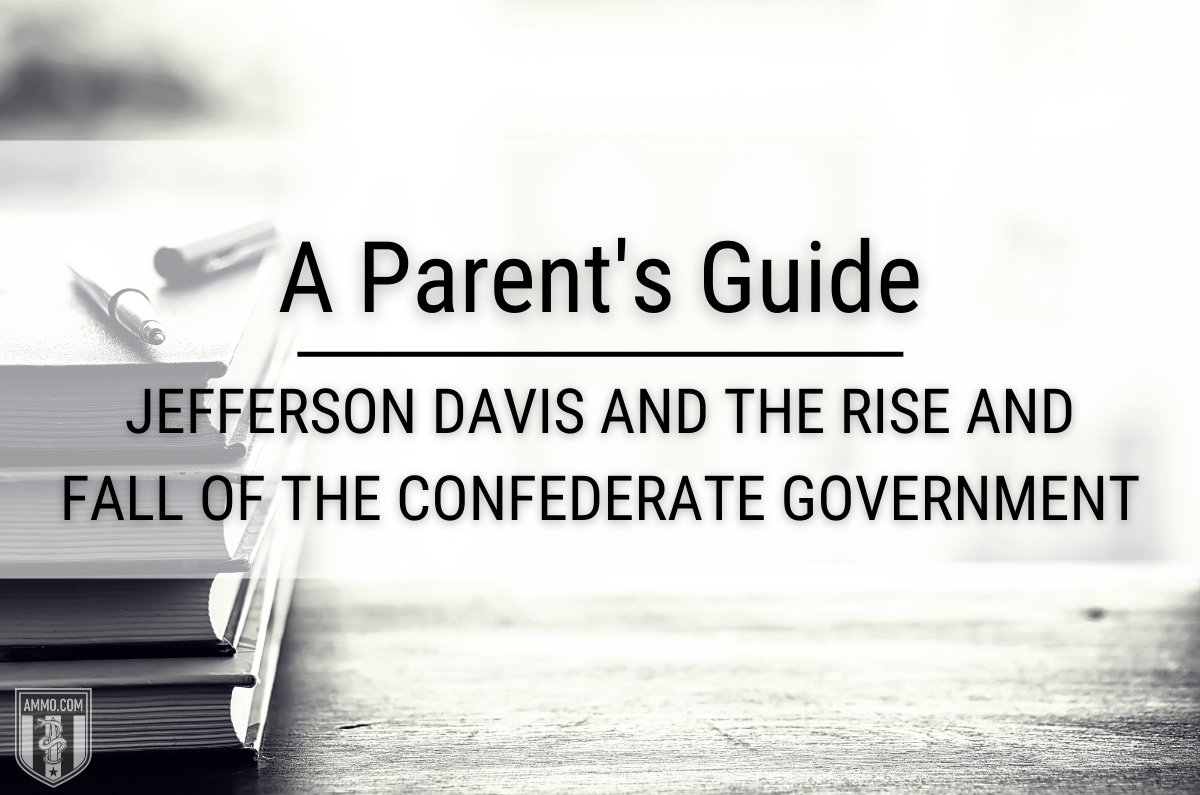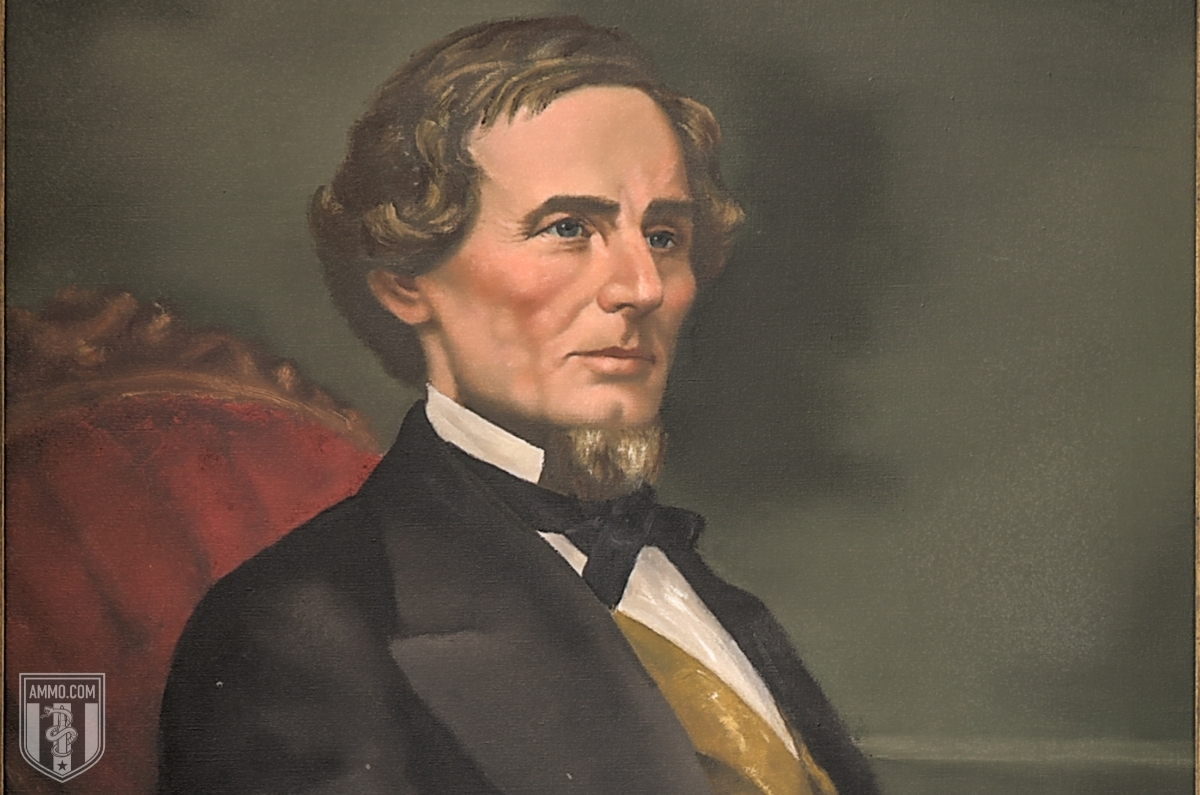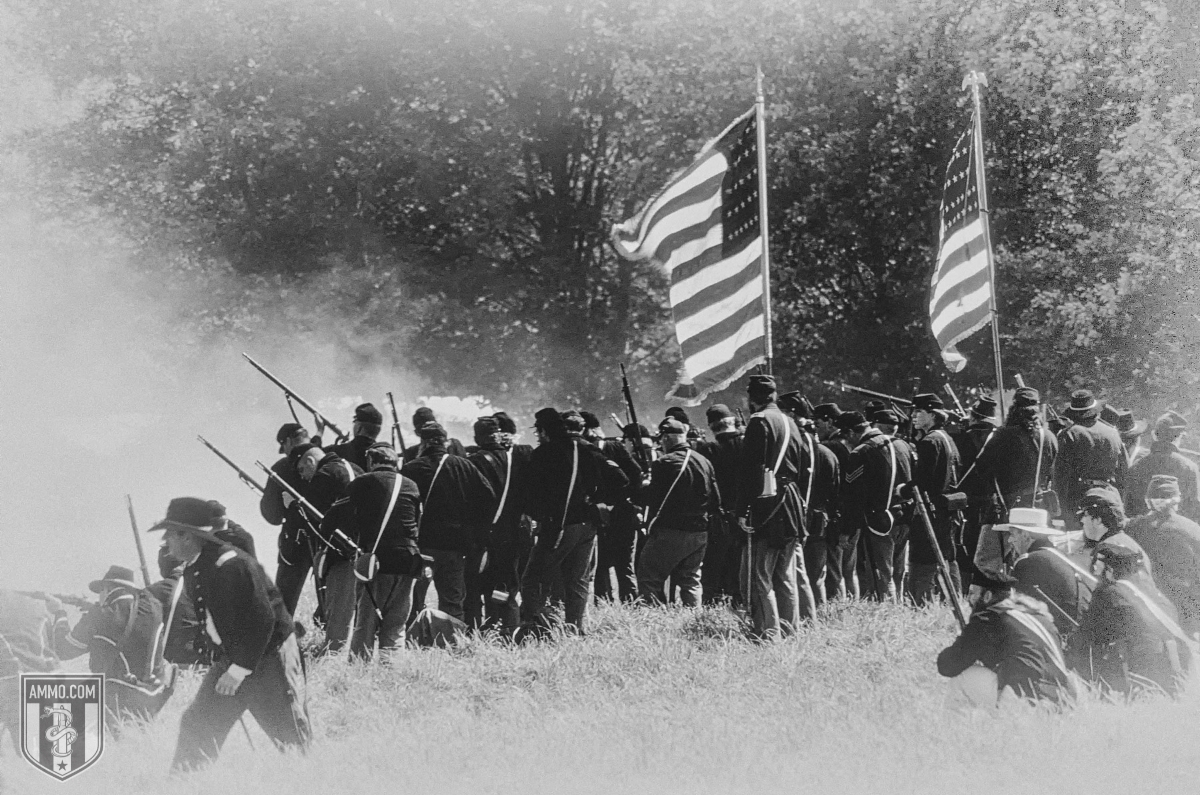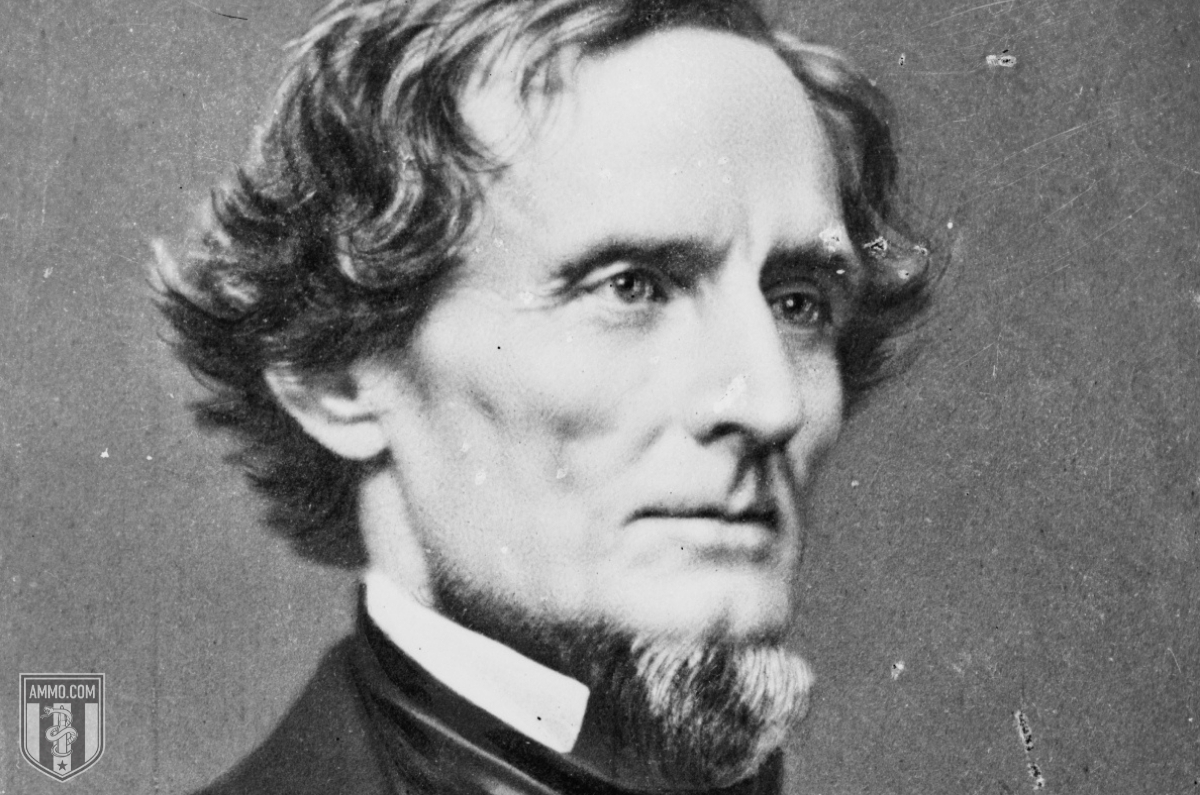 Two individuals come to mind at the mention of the Confederate States of America, General Robert E. Lee and Former-President of the Confederate States, Jefferson Davis. Both General Lee and Davis were men of principle and conviction as they stood up for what they believed; however, for a variety of historically complicated reasons, General Lee became a far bigger symbol of the Confederacy after its demise than Davis. Although Davis remains a sort of avatar for the end of states’ rights, some have come to view him as a Southern patriot.
Two individuals come to mind at the mention of the Confederate States of America, General Robert E. Lee and Former-President of the Confederate States, Jefferson Davis. Both General Lee and Davis were men of principle and conviction as they stood up for what they believed; however, for a variety of historically complicated reasons, General Lee became a far bigger symbol of the Confederacy after its demise than Davis. Although Davis remains a sort of avatar for the end of states’ rights, some have come to view him as a Southern patriot.Who Was Jefferson Davis?
Named after then-President Thomas Jefferson, Davis was born in 1808 less than 100 miles from where President Lincoln was born eight months later. Of Welsh stock, Davis was unsurprisingly born to a patrician planter family of Kentucky. His family moved to Louisiana and then to Mississippi, the state that Davis would represent in Congress for several years.
The youngest of ten children, Davis’s eldest sibling was a brother 23 years his senior. His father passed away when he was 16 years old. As a child, he attended the prestigious Saint Thomas at St. Rose Priory school where he was the lone Protestant student. He later attended West Point, where he was largely undistinguished. Considering the caliber of young men who attend West Point, this is no sleight against him, and he graduated 23 out of 33 in his class.
Davis was a participant in the somewhat famous Eggnog Riot, also known as the Grog Mutiny, where a massive amount of whiskey was smuggled on campus with predictable results. Alcohol was technically banned, but West Point generally looked the other way about the consumption of eggnog around Christmas time. In 1826, illicit alcohol use had gotten out of hand, so the school decided to enforce the rule over Christmas. This lead to the smuggling and the subsequent riot resulting in twenty cadets being court-martialed; fortunately, Davis was not one of them.
Upon graduation, he was commissioned as a Second Lieutenant, where he served under future President Zachary Taylor in the Michigan Territory. He married Taylor’s daughter against the General’s wishes. Taylor did not personally object to Davis, he merely objected to his daughter marrying a military man. Tragically, both became extremely ill with either yellow fever or malaria and she passed away three months into their marriage.
He went to Cuba to recover from his illness with James Pemberton, his lone slave at the time in 1835. In 1840 he was called to politics and had expanded his holdings to 40 slaves, which was impressive wealth for a young man by the standards of the time.
Congressman Jefferson Davis
Jefferson Davis attended a meeting of the local Democratic Party and was selected as a delegate for the state convention. In 1843, he was selected as a candidate for Congress but lost his first election. He was noted as an effective campaigner for the 1844 candidate and later President James K. Polk – he even served as an elector from the state of Mississippi.
Davis married his second wife, Varina Banks Howell in 1845, once again over the objections of parents. The Howells were a Whig family and Davis was some 17 years older than she was. That same year, Davis was elected to the 29th Congress. The couple eventually had six children, three survived into adulthood and two survived Davis. Only one, Margaret Howell, married and had children.

Davis in the Mexican-American War
Despite having left military life, Davis answered his country’s call during the Mexican-American War and raised a volunteer regiment, the Mississippi Rifles. Davis served as colonel underneath General Zachary Taylor, the father of his late wife. The unit was so-called because it was the first regiment to be armed with rifled firearms. General Winfield Scott tried to prevent the regiment from receiving the rifles, but Davis called in a favor to President James K. Polk, starting a life-long feud between the future Confederate President and the Whig Army hero.
By all accounts, Davis was a soliders’ soldier during the war, taking a bullet in the foot during the Battle of Buena Vista. His service during the War prompted his erstwhile father-in-law General Taylor to comment "My daughter, sir, was a better judge of men than I was.” In a foreshadowing of things to come, Taylor offered to commission Davis as a general of a militia brigade. Davis declined because he did not believe that the federal government had the power to commission officers of a militia.
Senator Jefferson Davis
When Davis returned from the Mexican-American War he was a hero to the State of Mississippi. Governor Albert G. Brown appointed Davis as a temporary Senator to replace the recently departed Jesse Speight, with the state legislature formally electing him later that year. He was a strong voice for annexing a larger part of Mexico and Cuba, that was ultimately incorporated into the Union. These causes were advanced by the slaveholding states, but some wished to grab Cuba from Spain simply to deny a European power an outpost that close to the American mainland.
Davis was elected to a full term in the Senate but resigned less than a year into this term to run for Governor of Mississippi against fellow Senator Henry Stuart Foote , to whom he lost by a scant 999 votes. He continued his service to the Democratic Party by campaigning for Democratic candidates in Mississippi and other Southern states.
In January 1852, Davis attended a convention in Mississippi regarding the topic of states’ rights. This was a pressing issue in the years leading up to the Civil War, one which the Southern states were keenly interested in. President Franklin Pierce tapped Davis as Secretary of War where he served for the entire term. Pierce was denied renomination by the Democratic Party and so Davis once again campaigned for Senate. Davis re-entered the Senate in 1857.
These were some of the most crucial years in the history of the Republic. The contradictions of having half of a country based on slave labor and the other half on free labor were coming to a head.
States’ Rights and the Lead Up to the Civil War
Much of the tension between the North and South took the form of states’ rights around whether or not the federal government was going to be able to ban slavery in the territories. While it is often said that the Republican Party was founded to end slavery, this is wholly untrue. The primary motivation behind the founding of the Republican Party was simply to ensure that the territories, and the massive amounts of land they contained, would not be given away to large plantation owners, but would instead be kept for free – and, it must be said, white – labor.
The first of these challenges was the Wilmot Proviso, introduced by David Wilmot. At that time, Wilmot was a Northern Democrat, but one known as a party man and a loyalist of President Polk. He defected from the Democratic Party in 1848 to the newly formed Free Soil Party , a largely single-issue party dedicated to preventing the spread of slavery into the territories. The Wilmot Proviso, which would have undone the Compromise of 1820 by banning slavery in all land acquired from Mexico, failed to pass three times in 1846, 1847, and 1848.
Everyone thought that the Compromise of 1850 was going to solve everything. Its main provisions established the following:
- Settled the Texas border which allowed for further admission of states and territories in land formerly belonging to Mexico
- Admitted California to the Union as a free state and established New Mexico and Utah as territories
- Required California to send one free and one pro-slave Senator
- Established that the status of New Mexico and Utah were to be determined by popular sovereignty
- Banned slave trade in the nation’s capital
- Beefed up the Fugitive Slave Law
The terms were generally not enthusiastically received by what we can reasonably call the “free soil” forces in the country – anti-slavery Northern Democrats, anti-slavery Northern Whigs, the American Party, and the Liberty Party. However, it wasn’t odious and is largely credited with postponing the War Between the States for another decade.
That being said, it all fell apart with the Kansas-Nebraska Act – which was considered odious. So odious in fact that it destroyed the Whig Party. The original name of the Republican Party was the Anti-Kansas Nebraska Party as the law became associated with the total dominance of the slaveholding states over the North.
The perspective that the slaveholding states were in the saddle is by no means without merit and is worth examining for a second before we proceed. The slave states, if not explicitly pro-slavery forces (though this was often the case) controlled several key areas of the federal government for the lion’s share of American history. This included the office of the Presidency, the Speaker’s chair, and the chair of the powerful Ways and Means committee. The practical effect of this was that the slave states controlled the veto, decided what was discussed on the House floor, determined the rules of the House, and how money was spent.
The more educated Northerners were well aware of this and even if they didn’t have much sympathy for the slaves on moral grounds, they did not like the influence of the slave states on the federal government. Two things inflamed their anger and effectively created the groundwork for the Civil War.
First, there was the aforementioned Kansas-Nebraska Act. This created two territories – Kansas and Nebraska – and made popular sovereignty again the process by which their slave status would be determined. This outraged Northerners, who believed that these territories, which were quite far north of the Missouri Compromise line, would be reserved for freeholding homesteaders. Some argued that the compromise itself was unconstitutional, but this position found little traction outside of the slave states. The writing was on the wall. None of the territories conquered from Mexico, save for California, would be explicitly reserved for free labor.
If the Compromise of 1850 saved the Union, the Kansas-Nebraska act most certainly destroyed it.
The final nail in the coffin was the Dred Scott decision. A slave sued his master for freedom because he entered a free state with him, and should now be free. The Supreme Court did not agree. The main legal precedent was that blacks, free or slave, had no rights in the United States and thus could not pursue satisfaction in a court of law. The more important practical decision was that slavery could not be banned in the territories by the federal government, only the territorial government.
Most frightening for free Northern labor was the specter of slave labor in the north. After all, if slaveholders were free to take their “property” into the North, what would prevent them from doing so if it were economically advantageous? While it’s a stretch, it was not entirely unreasonable for free Northern labor to believe that it would soon compete with Southern slave labor.
This was a driving factor to why the Republican Party found increased resolve among its base.
For the South, the fear was that Lincoln would emancipate their slaves, but there is scant evidence to support this idea. While Lincoln and the Republican Party did eventually free the slaves, this was motivated far less by moral outrage than it was by pragmatism: Freeing slaves in conquered territories added manpower to the Union Army and deprived the Southern plantation class of their wealth and power.

Jefferson Davis and the Crisis of the Union
The general impression of Davis is that he was a hardcore, dyed-in-the-wool secessionist, but this is simply not true. In the years between Dred Scott and secession, few campaigned to preserve the Union more than Jefferson Davis. He gave a speech on a boat en route to Boston on the Fourth of July, 1858, and gave another anti-secession speech at the historic Faneuil Hall.
Davis believed in the right to secession but did not, at least at the time, think that it was something that ought to be exercised. He did not believe that the differences between the two halves of the nation had, as of yet, become irreconcilable. It is worth noting that the right to secession was largely a Southern prerogative and even then it wasn’t universal – President Jackson told South Carolina in no uncertain terms what would happen if it tried to secede.
Even the Confederacy did not include a right to secede in its Constitution, though it was discussed and pushed heavily by South Carolina, the first state to secede.
Furthermore, Davis was nothing if not a practical man. Having been Secretary of War, he did not believe that the South had the resources or military manpower to defeat the Northern states in what would almost certainly be an inevitable war of secession. However, when his country Mississippi called, following South Carolina’s lead as the second state to secede from the Union. On January 21, 1861, he gave a farewell address to the Senate and resigned, a day that he called the saddest day of his life.
Who Killed the Confederacy? President Davis or States’ Rights?
Jefferson Davis was elected provision President of the Confederacy by acclamation on February 18, 1861. The position was made permanent four days later. The only other man who was seriously considered was Robert Toombs who briefly served as Secretary of State of the new nation. The Vice President was Alexander H. Stephens , with whom Davis butted heads almost constantly.
The Civil War began when Federal troops attempted to resupply Fort Sumter and were prevented from doing so by the Confederates. For their part, the Confederates attempted to negotiate a purchase of the Fort and assume their portion of the national debt. Lincoln refused to meet with them because they were in rebellion and to meet with them would give them legitimacy. When reinforcements came, Davis had to decide whether to allow it peacefully or to attack the Fort. He chose the latter and this is when the war began.
There was a brief love affair with Davis, who was so shaken by the news that he was elected President that his wife thought someone had died. However, for most of the war, he was intensely disliked by the Confederate Congress, the Confederate military, and indeed, the Confederate people. In a letter, General Beauregard wrote that "If he were to die today, the whole country would rejoice at it."
Davis was a patriot and a capable soldier, but he was woefully unprepared for the tasks of forging a new nation. He tended to appoint trusted friends and confidants to senior military positions and steadfastly resisted appointing a general-in-chief, essentially acting in this role as well as the President. He ignored non-military crises in the new country and rarely appealed to the small farmers who made up the bulk of the nation’s population. His various illnesses kept him out of commission for days at a time.
This has led to a debate about what killed the Confederacy – states’ rights or Davis?
We’ve discussed Davis' flaws, now let’s consider states’ rights. While we certainly believe that the 10th Amendment codifies several powers expressly for the states, it’s incredibly difficult to fight a war of independence against a neighboring power on this basis. Indeed, many states denied funds and some, most notably Texas, manpower to the central government because they feared encroachment on their rights. The extent to which this harmed the Confederate war effort cannot be overstated.
What's more, the war effort became increasingly resented (along with Davis) because big plantation owners were exempt from the draft . In fairness, Northerners could buy their way out of the draft and many did, including future President Grover Cleveland, and this was widely resented, resulting in riots in some cases . The North could afford resentment with its industrial power, manpower, and international recognition.
In this perspective, the problem was less Davis than that he was hamstrung by the limitations of the Confederacy. No less a figure than Robert E. Lee said that "I knew of none that could have done as well."
As with most things, it’s probably a combination of both – Davis was no George Washington, and the Confederate system and a general lack of Confederate patriotism didn’t help either.

Did the Civil War Kill States’ Rights?
Before the Civil War, the United States was seen much more as a collective of sovereignties. After the war, it was clear that there was but one – the Federal government. The question remains, was the Civil War the end of States’ Rights?
It was, albeit briefly. The Reconstruction Era meant the end of states’ rights, but they came back with a vengeance after the end of this period and largely remained unchanged until the Civil Rights Era, when the federal government passed sweeping laws aimed at Jim Crow, voting rights, and other areas.
State governments are again under renewed attacks by the left in America who are increasingly frustrated that San Francisco, New York, and Los Angeles cannot tell the rest of the country how to live. The Democratic regime of Joe Biden is, much like the Reconstruction government that preceded it, looking for ways to centralize power in the hands of the Federal government. This would require a radical attack on states’ rights in its most powerful form – the Electoral College.
While states’ rights aren’t what they used to be, they still exercise a great deal of power in the United States. For example nullification, generally thought of as a quirky relic of a bygone era of the pre-Civil War days is alive and well today. Additionally, many states have legalized recreational use of marijuana despite federal laws to the contrary, while others have declared that they will not enforce federal immigration laws.
The only question of states’ rights that the Civil War settled was which body was supreme – the states or the feds. Thus, states’ rights were weakened considerably and the ultimate seat of sovereignty became, indisputably, the federal government. States’ rights are still alive (at least for now) and kicking – they are a lot more powerful than most people think.







